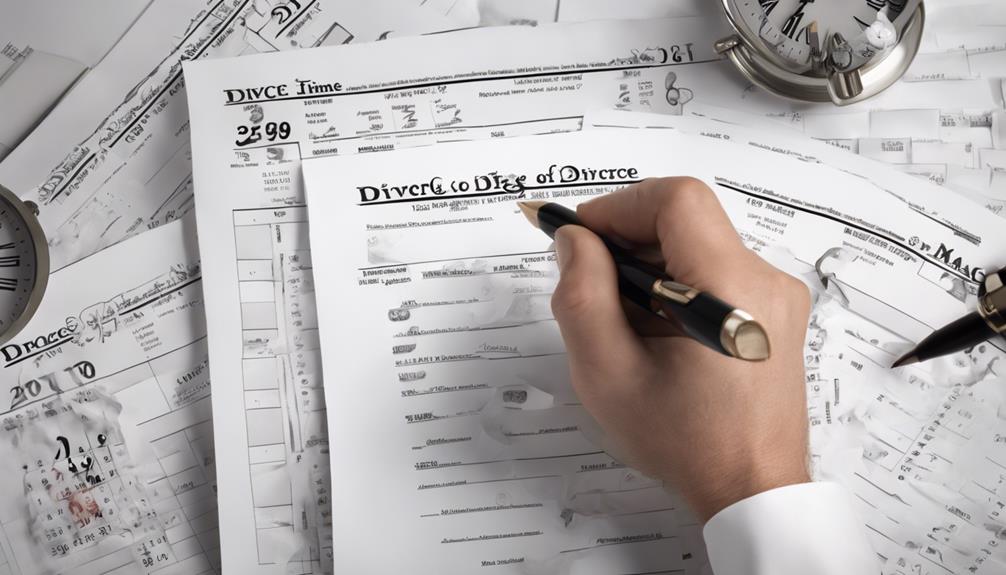Experiencing a divorce in Connecticut can appear overwhelming, however, our guide breaks down the process into five simple steps to follow.
From understanding residency requirements to finalizing your divorce, each stage is crucial. But there's more to it than just paperwork and court dates.
So, what are the key considerations that could impact your divorce journey in Connecticut?
Let's uncover the intricacies of each step together, ensuring you're equipped to make informed decisions every step of the way.
Key Takeaways
- Understand residency requirements to meet Connecticut's 12-month rule or grounds for divorce.
- Focus on irretrievable breakdown as grounds for a streamlined divorce process.
- Complete specific forms accurately for efficient filing, aiming for an uncontested divorce.
- Ensure proper service of divorce papers to establish court jurisdiction and avoid delays.
Residency Requirements for Divorce in CT
Understanding the residency requirements for divorce in Connecticut is crucial before initiating the legal process.
In the state of Connecticut, to file for divorce, at least one spouse must have been a resident for a minimum of 12 months before filing. However, if the grounds for the divorce occurred within Connecticut, there's no specific residency duration needed. This flexibility allows non-residents to file for divorce in Connecticut if the reason for the dissolution of the marriage took place in the state.
Meeting these residency requirements is fundamental to kickstart the divorce process smoothly and efficiently. Before commencing any divorce action, ensuring compliance with Connecticut's residency prerequisites is paramount for a successful dissolution agreement.
This knowledge not only streamlines the divorce process but also ensures that the legal proceedings align with the state's regulations, providing a solid foundation for any potential issues that may arise, such as matters concerning domestic violence.
Grounds for Divorce in Connecticut

Exploring the grounds for divorce in Connecticut reveals that it's a no-fault state, allowing spouses to cite irretrievable breakdown of the marriage as the primary reason for seeking dissolution. In Connecticut, no proof of fault or misconduct is required to file for divorce, making the process more straightforward.
However, there are fault-based grounds available for those who prefer to use them, such as adultery, fraud, intolerable cruelty, and abandonment. Despite these options, irretrievable breakdown remains the most commonly cited reason for divorce in Connecticut due to its ability to streamline the process without assigning blame to either party.
Understanding the specific grounds for divorce in Connecticut is crucial for individuals navigating the dissolution of their marriage, as it empowers them to make informed decisions and approach the legal proceedings with clarity. By recognizing the no-fault nature of divorce in Connecticut, couples can focus on resolving their differences amicably and moving forward with their lives.
Filing for Divorce in CT
When filing for divorce in Connecticut, it's essential to complete specific forms available on the Connecticut Judicial Branch's website. Ensuring accuracy and completeness in these forms is crucial for initiating the divorce process smoothly. Here are some key considerations to keep in mind:
- Uncontested Divorces: Opting for an uncontested divorce in CT can expedite proceedings and reduce expenses significantly. Typically, a marital settlement agreement is required, outlining agreed-upon terms regarding assets, liabilities, alimony, and child custody.
- Nonadversarial Requirements: Nonadversarial divorces in Connecticut have specific criteria that must be met to qualify for this streamlined process. Understanding and meeting these requirements can make the divorce process more efficient.
- Professional Help: Seeking assistance from professionals such as mediators or legal consultants can be beneficial in resolving disputes amicably and navigating the complexities of the divorce process effectively.
Considering the nuances of filing for divorce in Connecticut, exploring options like DIY approaches or professional guidance is advisable to ensure a successful outcome.
Serving Divorce Papers in Connecticut

To serve divorce papers in Connecticut, a state marshal or another qualified individual must deliver the Summons, Complaint, and Notice of Automatic Orders to the spouse. This crucial step initiates the divorce process by officially notifying the spouse of the legal proceedings and their responsibilities outlined in the documents.
Service of process is essential to ensure that the spouse is aware of the divorce and to establish jurisdiction for the court to proceed with the case. Proof of service acts as a confirmation that the necessary paperwork has been properly delivered, allowing the court to move forward with the divorce proceedings.
It's important to adhere to the specific requirements for serving divorce papers in Connecticut to avoid delays or complications in the process. By following the correct procedures and ensuring the spouse receives the required documentation, you can set a solid foundation for the divorce proceedings in Connecticut.
Finalizing Your Divorce in CT
After successfully serving divorce papers in Connecticut and ensuring that all necessary documentation has been delivered, the next crucial step in the divorce process is finalizing the divorce through a final hearing with the court. During this final hearing, several key aspects need to be addressed to conclude the divorce proceedings effectively:
- The final hearing typically results in a court order that outlines the terms of the divorce settlement. This document is crucial for both parties to understand their rights and responsibilities post-divorce.
- It's essential for couples to ensure that all aspects of the divorce agreement are thoroughly addressed and finalized during this hearing to prevent any misunderstandings or disputes in the future.
- Following the final hearing, the court issues a divorce decree formally ending the marriage. This decree is a legal document that signifies the official dissolution of the marriage and provides a clear path for both parties to move forward independently.
Finalizing a divorce in Connecticut involves more than just the legal procedures; it also marks the beginning of post-divorce considerations such as modifying court orders, updating estate planning documents, and adjusting to life after divorce.
Frequently Asked Questions
How Fast Can You Get Divorced in Ct?
We can finalize an uncontested divorce in CT in as little as 90 days. Contested divorces vary in duration, influenced by case complexity and court availability. Factors like child custody disputes or asset division affect speed.
Does It Matter Who Files for Divorce First in Ct?
It doesn't matter who files for divorce first in CT. Both spouses have equal rights and opportunities in the process. Our experience shows that the order of filing doesn't impact the outcome of divorce proceedings.
Do You Have to Be Separated for a Year to Get a Divorce in Ct?
No, in Connecticut, there is no mandatory one-year separation period required before getting a divorce. The state allows for no-fault grounds for divorce, declaring the marriage irretrievably broken down, eliminating the need for a specific separation duration.
What Is the Cheapest Way to Get a Divorce in Ct?
The cheapest way to get a divorce in Connecticut usually involves opting for an uncontested divorce. By agreeing on key issues like property division and child custody, couples can save on legal fees and court costs.
Are the Steps for Expedited Divorce in CT Different from the Comprehensive Guide?
Yes, the steps for a quick divorce process expedited in CT are different from a comprehensive guide. Expedited divorce in CT typically involves a simplified legal process, while a comprehensive guide may include more detailed steps for a traditional divorce. It’s important to understand the specific requirements for each process.
Conclusion
In conclusion, navigating the divorce process in Connecticut can be challenging, but with the right guidance and support, it's possible to achieve a successful outcome.
Did you know that Connecticut has one of the lowest divorce rates in the country, with only about 9% of marriages ending in divorce?
Remember, seeking legal assistance and following the steps outlined in this guide can help you navigate the complexities of divorce and move forward with confidence.










